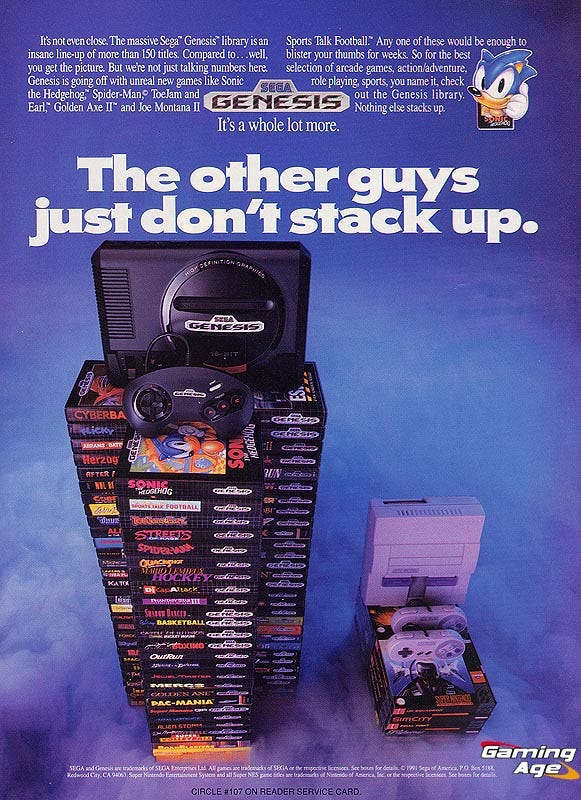This article on ‘Why The Nintendo-SEGA Console War Is So Remembered Even Today’ was available earlier as part of the GamerBraves Newsletter. Sign up for free to gain access to more articles about news and trends in the gaming industry and community.
Original Article: This week, 40 years ago Nintendo released their first ever console The Famicom, better known as the Nintendo Entertainment System on the 15th of July 1983. Little do people know that SEGA also released their first console, the SEGA SG-100 on the exact same day.
While the SG-100 isn’t the most remembered console (it didn’t even launch outside of Japan) it would be the spark of Nintendo and SEGA’s console war rivalry that would last throughout the 80s and 90s, coming to a head with the Super Nintendo Entertainment System (SNES) vs the SEGA Genesis.
The funny thing is that this all happened before I was even born yet it’s still something that’s prevalent to this day. Just be part of the Gaming community or get more into almost any retro game and you’ll inevitably pick up a few of the details of how wild the Nintendo-SEGA console war even compared to the Xbox and PlayStation feuds of today. So I figured let’s talk about it what made this 90s Console Clash so memorable even to those that weren’t around at the time.
Those Ads
Yep, if there’s one thing everyone has seen from the Nintendo SEGA console war, it’s this ad with that slogan: Genesis Does What Nintendon’t. Nowadays even with any animosity between competitors, you’re expected to act respectfully at least in public but back then, there seemed to be no shame in bad-mouthing the competition.
SEGA was the underdog in the 90s and they came in swinging to not only show that their console was a radical cool kid on the block but that Nintendo was lame, had worse graphics, and slower titles for little kids, and it worked. They not only to a large chunk of the market but even to this day, that tune is still catchy. This wasn’t the only one either, SEGA made a slew of ads all about making it clear which was the cooler of the two consoles.
And after a while, Nintendo decided to hit back with the trailer for Donkey Kong Country, a game more aimed at the same 90s cool crowd that SEGA appealed to. Nintendo of America Former Vice President of Marketing and Corporate Affairs Perrin Kaplan even said that at one point Nintendo planned to dump a load of Bananas onto the parking lot of SEGA’s American office but ultimately didn’t because it’d be a waste of food.
It’s basically the equivalent of two children calling each other names but there’s something so hilariously in-your-face about these ads, acting as almost a time capsule of gaming culture in the 90s.
Mario and Sonic

This also extended to the two companies’ mascots as well. Sonic was not only made to compete with Mario but embody the 90s youth culture of the time with a little thing called attitude.
If Mario was family-friendly, Sonic was fast, slick, and had a rebellious personality. These are personality aspects that people not only associate with the characters to this day but also cemented how the two consoles would be seen, the SNES produced high-quality titles with creative art styles and gameplay, while the Genesis was more violent and brought in great action for the “hardcore” audience (well, as hardcore as a cuddly blue hedgehog can be I suppose).
This is an area that extended past the marketing however and into the two machines themselves.
Two Very Different Consoles

While fanboys may bicker, at their core the PlayStation 5 and Xbox Series X|S aren’t that different on the inside. They’re both more or less standalone PCs and the technological benchmark for the two are very similar. That’s a good thing though, it means that it’s easier to bring games to both systems.
The SNES and Genesis weren’t like this however, they were completely different beasts. While they were both 16-bit machines, the SNES was generally more powerful, had more colors, and had a better sound chip but the Genesis had faster processing power (or as the Ads called it “Blast Processing”). Not to mention the SNES controller had six buttons while the Genesis had only three.
This meant that any multiplatform games released for both could be very different on each machine. Fighting games would have completely different movesets for The Genesis, while games like Earthworm Jim had levels missing on the SNES version. The fact that they both had vastly different sound chips also meant that a game’s OST had to be wholly rearranged for both consoles, the Genesis had a more tinny rock sound while the SNES had more orchestral music.
Aladdin

Probably the most famous case study is the Aladdin video game released on both consoles. It had the same title and was based on the same Disney movie, released in the same month but each version was an entirely different game. Aladdin on Genesis was developed by Virgin Games and is more of an action game, while Aladdin on SNES was developed by Capcom and is a pure platformer.
This all meant that making games for both consoles would take a lot more effort and there was more to debate over which version was better. And that’s not even getting into the exclusives.
The Exclusives

As you can imagine the differing hardware also leads to a lot of exclusive software as developers would focus on one system over the other. If you think about modern times where first-party games are seen as the heavy hitters among all the third-party titles, here it feels like almost two different planets. I’ll admit going back to older games, the SNES is a bit easier to navigate thanks to familiar faces like Final Fantasy and Metroid, but it’s impressive that if you look up the top 20 SNES and Genesis games, you’ll get very little overlap.
This was a time when Nintendo got all the major third-party support from the big Japanese publishers but SEGA was very persistent. For almost any type of game that Nintendo had on their console, SEGA would have a similar equivalent to compete with it, or vice versa. The most famous of these was, of course, the creation of Sonic but he was far from the only one:
- Nintendo had Final Fight, SEGA had Streets of Rage
- Nintendo had Legend of Zelda, SEGA had Crusader of Centy
- Nintendo had Final Fantasy, SEGA had Phantasy Star
- Nintendo had Donkey Kong, SEGA had Vector Man
Anything Nintendo did, SEGA tried to do bigger and better, and regardless of which of these games you prefer, it’s interesting to see how each of them differed to fit the “style” of the console.
SEGA games tended to be more arcade-like, shorter but with a focus on faster, and more action-packed gameplay. Nintendo games took more advantage of being on console, with longer games that had more atmospheric visuals and sound. This is why beat ‘em ups like Streets of Rage were generally considered better on the Genesis while RPGs excelled on Super Nintendo.
All Fun and Games

When thinking about why the Nintendo and SEGA console war is so remembered, a lot of it does come down to the crazy ads and stunts however I think a lot of it is how larger than life the two consoles were shaped to be.
With the internet, we can find out anything we need to about the PS5, Xbox, and Switch, what games they have, and what their specs are like but back then, they couldn’t sell you like that so they sold the experience. If you wanted a more casual console with a lot of innovative new titles get Super Nintendo, want to be a rad dude who got the best arcade ports, get The Genesis.
The best part however is that since the 90s are now over, everyone can just have fun looking back at how silly this “consoles war” could get. With Mario and Sonic both crossing over into movies recently, there’s been a lot of ribbing from fans of both series but for the most part, people seem to be happy to see both mascots on the big screen.
We still see the occasional cheeky jab from the big console manufacturers, but if the discourse surrounding the Microsoft Activision Blizzard acquisition has shown anything, they tend to leave the fighting to their fanboys. It’s just moved from kids in the schoolyard to adults online. With how internet discourse usually goes, it’s probably best the companies themselves aren’t egging it on the same way Nintendo and SEGA did back in the day.
Still, the SNES and Genesis console war brought out some of the best games and marketing from both sides, talked about to this day, and if anything good came out of these, it’s that.











![[SEA Exclusive] From Shadows to Shipwrecks – Jennifer English Talks About Bringing Emotional Depth to Clair Obscur: Expedition 33](https://cdn.gamerbraves.com/2025/04/Clair-Obscur-Jennifer-English_Interview_FI-360x180.jpg)

![[EXCLUSIVE] Do the Game Interview – An Intimate Look at the Challenges of Game Development](https://cdn.gamerbraves.com/2025/04/Do-the-Game_Interview_FI-1-360x180.jpg)
![[EXCLUSIVE] Interview with the Minds Behind of Den of Wolves – 10 Chambers’ New Sci-Fi Heist FPS](https://cdn.gamerbraves.com/2025/04/Den-of-Wolves_Interview_FI-360x180.jpg)









![[GUIDE] Finding Alma’s Lost Glasses in The Apple of Her Eye Side Quest](https://cdn.gamerbraves.com/2025/04/Alma-Glasses-Quest_Gudie_FI-360x180.jpg)



![[GUIDE] Farming Nightflower Pollen in Monster Hunter Wilds](https://cdn.gamerbraves.com/2025/03/MHWilds-Pollen_Guide_FI-360x180.jpg)
